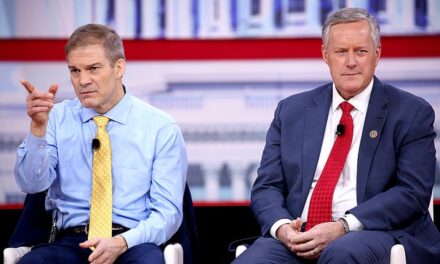It’s really rare that I learn something for someone’s clever “take” on politics, but it happened today when I looked at Jonathan Last’s latest column for The Bulwark. The lattice of the piece is a look at the company Red Bull. It turns it, this world famous company is 100 percent dedicated to marketing. That’s why you don’t just see their logo on soccer jerseys but see soccer teams named the “Red Bulls.” They don’t actually produce the energy drinks. That job is subcontracted out to an Austrian juice company. The Red Bull corporation spends all its energy getting attention for the brand.
While this is interesting in itself, Last uses this novel business arrangement as a metaphor for Republican lawmakers like Matt Gaetz, Marjorie Taylor Greene and Madison Cawthorn. In fact, he uses it as a metaphor for the entire Republican Party. He even goes further by comparing the consumers of Red Bull to the consumers of right-wing messaging.
The thing is, this has surprising explanatory power.
Last talks about a post-scarcity economy, meaning an economy where people’s basic needs are met so they’re more interested in buying feelings. Politically, this means that folks no longer want anything tangible from government. They don’t want health care or a stimulus check or something to be done about climate change. Of course, at least half the people in this country don’t fit this description, and most of them are Democrats.
But Last correctly points out that Democrats do not understand the post-scarcity folks at all.
Does it matter to his future political prospects that Matt Gaetz doesn’t advance legislation? Does it matter that Madison Cawthorn staffed up his office with comms people? Does it matter that Marjorie Taylor Greene doesn’t have committee assignments?
Well, these quirks would matter in a system where legislative accomplishments influenced voter behavior. But the preponderance of evidence suggests that Republican voters don’t care about tangible government outcomes.
They don’t care whether or not a border wall is built, or who would have (theoretically) paid for it. They don’t care about whether or not the government fails to manage a global pandemic, killing hundreds of thousands of their fellow citizens. They don’t care if unemployment is up—or down. They don’t care about stimulus checks. Or the national debt.
It’s a little bit like—check that—it’s exactly like Red Bull.
What Last means is the both the company Red Bull and the people who buy Red Bull care very little about what is in the can. They’re selling or buying a feeling. What matters is that the purchase is made and the emotion is felt, but the quality of the drink is almost wholly beside the point. If people chose Red Bull over its competitors for its superior taste or energy-producing effects, then the marketing model would be much different. The company understands what drives sales and it is not substance.
Likewise, Republican lawmakers now realize that real power doesn’t come from delivering on political promises but from getting attention. The way to get attention is to make a lot of people feel a certain kind of way. Madison Cawthorn, the wheelchair-bound freshman congressman from North Carolina, doesn’t have policy people on his staff. His staff is designed to make him famous. That’s it. And he can get famous by pissing liberals off.
That’s the model for acquiring power in the Republican Party because the majority of Republican voters don’t have anything they want from the federal government. Sure, they might want abortion outlawed, but you may have noticed that confirming judges is about the only thing the congressional Republicans did during Trump’s term in office. Neither their general inactivity nor their failure to deliver on abolishing Obamacare and building a border wall had any noticeable depressive effect on the base’s enthusiasm for Trump’s reelection. The Republicans actually gained seats in the House and nearly kept control of the Senate.
Democrats are different.
Democrats do not seem to understand this new development in Republican politics, perhaps because they do not live in a post-scarcity political world. There are still a great many legislative outcomes that Democrats want from government. So they think that the governing matters more than getting attention.
That’s why Joe Biden won the nomination in a walk, even though he was practically allergic to attention. Instead, Democrats wanted a president who could deliver at least part of a long list of legislative outcomes: Vaccine distribution; closing the loophole on Obamacare’s subsidy cliff; creating a public option; granting statehood to the District of Columbia; creating a federal slate of voting rights protections; using the power of government to decrease carbon emissions; and so on.
It’s an essential point that Biden won the nomination and, especially, the election while doing very little campaigning. He was lampooned for hiding in his basement, but it was not far from the truth. The Republican model works, but it’s merely a competitive model, not some magic trick. A lot of people still want and expect things from the federal government–either for themselves, for other people, or for the future of humanity. Biden is one of those people and he’s operating politically as if pleasing those people is important not just on the merits but for maintaining power.
Both sides can be correct about what works politically, and I think that’s the case here, at least for the moment. We’re living in a battle between feelings and substance.
This helps explain why the Democrats get so little traction by delivering on health care or other major political promises. The people who reward those results were already voting for them. To make real inroads into the Republican base, they need to create a more direct connection to people’s lives. In the past, this came through union membership, but something needs to replace that to make people feel like the Democrats are on their side.
My best guess is that the solution need to be architectural. It won’t happen through fighting within the news cycles but by rebuilding the structural relationship between people and their government. The truth is, most Republicans aren’t actually living in a post-scarcity world. The most solidly red areas of the country and also the most hollowed out economically. They’re hollowed out by global competition that has closed their factories but also by monopoly power that has crushed their entrepreneurial spirit and options. Amazon, Wal-Mart and deunionization have done more to radicalize the communities than any woke liberal.
The modern media environment certainly plays a major role in creating an attention economy and an attention politics, but there’s no obvious quick fix for that. The answer must be slower and with a look to gradual transformation. If you can change the substance enough through patience and diligence, eventually substance will matter to these folks again. First they need to see and believe that you’ve given them something they need and that they need you to protect it for them. When the Republicans talk about privatizing Social Security or taking away people’s health care, that’s when they lose support from their base. People need to add more items to this list. Real antitrust enforcement is promising not because it will excite people in the short-term but because it will open up opportunities that folks will want protected in the future.
Similar things can be said about promoting alternative energy or battery-powered cars. As those industries grow, so will the political will and consensus to protect those industries.
So, the future for the left isn’t to do a better job marketing but to build a new architecture that ties people to the government and the government to the people.







